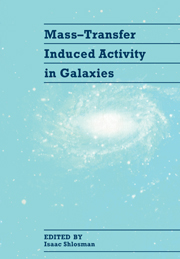Book contents
- Frontmatter
- Contents
- Preface
- List of Participants
- I INTRODUCTION
- II THE INNER PARSEC
- III THE CIRCUMNUCLEAR REGION
- IV GAS DYNAMICS AND STAR FORMATION IN BARRED AND NORMAL GALAXIES
- Star Formation in Barred Galaxies (Invited paper)
- Gas Dynamics and Star Formation in and Around Bars (Invited paper)
- Nuclear Starbursts in Barred Spiral Galaxies
- Molecular Inflows towards Galactic Nuclei
- Bar-Driven and Interaction-Driven Starbursts in SO/Sa Galaxies
- Gas Inflow due to Perpendicular Orbits in Barred Potentials
- Neutral Gas in the Barred Starburst Galaxy Maffei 2 (Poster paper)
- The Abundance Gradients in Barred Galaxies: the Role of Radial Flows (Poster paper)
- Bar Induced Non–Circular Molecular Gas Motions in M82 (Poster paper)
- Star Complexes and Evolution of Disk Galaxies (Poster paper)
- Interstellar Gas Flows in the Gravitational Potential Well of Density Waves (Poster paper)
- Massive Gas Rings in the Nuclei of Barred Spiral Galaxies (Poster paper)
- Pattern Speeds and Time Evolution in Ringed Galaxies from Observational and Simulational Databases (Poster paper)
- Large Scale Gravitational Instability and Galactic Viscosity (Poster paper)
- V NUCLEAR GAS AND LARGE-SCALE PROPERTIES OF AGN AND STARBURST HOSTS
- VI HOST GALAXY-AGN-NUCLEAR STARBURST CONNECTION
- VII GALAXY INTERACTIONS AND INDUCED ACTIVITY
- VIII GAS DYNAMICS IN ELLIPTICALS
- IX AGN AND STARBURST HOSTS AT LARGE REDSHIFTS
- X CONFERENCE SUMMARY
- Subject Index
- Object Index
- Author Index
Interstellar Gas Flows in the Gravitational Potential Well of Density Waves (Poster paper)
Published online by Cambridge University Press: 05 May 2010
- Frontmatter
- Contents
- Preface
- List of Participants
- I INTRODUCTION
- II THE INNER PARSEC
- III THE CIRCUMNUCLEAR REGION
- IV GAS DYNAMICS AND STAR FORMATION IN BARRED AND NORMAL GALAXIES
- Star Formation in Barred Galaxies (Invited paper)
- Gas Dynamics and Star Formation in and Around Bars (Invited paper)
- Nuclear Starbursts in Barred Spiral Galaxies
- Molecular Inflows towards Galactic Nuclei
- Bar-Driven and Interaction-Driven Starbursts in SO/Sa Galaxies
- Gas Inflow due to Perpendicular Orbits in Barred Potentials
- Neutral Gas in the Barred Starburst Galaxy Maffei 2 (Poster paper)
- The Abundance Gradients in Barred Galaxies: the Role of Radial Flows (Poster paper)
- Bar Induced Non–Circular Molecular Gas Motions in M82 (Poster paper)
- Star Complexes and Evolution of Disk Galaxies (Poster paper)
- Interstellar Gas Flows in the Gravitational Potential Well of Density Waves (Poster paper)
- Massive Gas Rings in the Nuclei of Barred Spiral Galaxies (Poster paper)
- Pattern Speeds and Time Evolution in Ringed Galaxies from Observational and Simulational Databases (Poster paper)
- Large Scale Gravitational Instability and Galactic Viscosity (Poster paper)
- V NUCLEAR GAS AND LARGE-SCALE PROPERTIES OF AGN AND STARBURST HOSTS
- VI HOST GALAXY-AGN-NUCLEAR STARBURST CONNECTION
- VII GALAXY INTERACTIONS AND INDUCED ACTIVITY
- VIII GAS DYNAMICS IN ELLIPTICALS
- IX AGN AND STARBURST HOSTS AT LARGE REDSHIFTS
- X CONFERENCE SUMMARY
- Subject Index
- Object Index
- Author Index
Summary
OVERVIEW
One–dimensional numerical simulations of a large–scale flow of interstellar gas in galactic spiral density waves were produced using the approach described by Roberts (1969), Shu et al. (1972, 1973), Woodward (1975), Marochnik et al. (1983), Lubow et al. (1986), and Berman et al. (1990).
We have employed a two–phase model for the initial state of the interstellar medium (ISM). Thermal processes and self–gravitation of the gas were taken into account. Magnetic fields were not included in this version of the mathematical model. A discussion on the role of the magnetic field and status of the two–phase model of ISM versus Supernova–dominated model can be found in Marochnik and Suchkov (1991).
We have used the Schmidt model of the galaxy and the following parameters of its spiral structure: Ωp = 23, 24, and 13.5 km s-1 kpc-1 (the angular velocity of the spiral pattern), F = 10% (the gravitational field of a spiral arm). The right-hand side of the energy equation is L = n(nΛ – Γ), where nΛ(T) and Γ are the standard cooling and heating functions, respectively (Penston 1970).
Numerical simulations of the interstellar gas flow have been produced for a number of galactocentric distances, R = 4, 5, 6, 8, 10 kpc and two different values of the initial density of the interstellar gas, n0 = 0.05 and 0.5 cm-3. Figure 1 demonstrates one of the examples simulated.
- Type
- Chapter
- Information
- Mass-Transfer Induced Activity in Galaxies , pp. 183 - 184Publisher: Cambridge University PressPrint publication year: 1994

